Beth Kephart's Blog, page 227
August 27, 2011
The calm before this storm
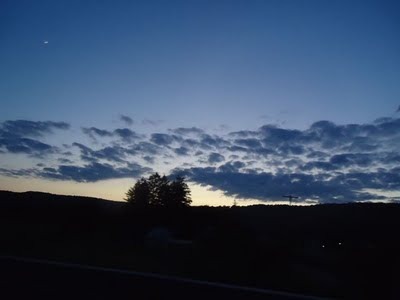 Yesterday, while 65 million people were reminded that they were in the path of Irene, this terrible storm, we drove north with our son toward his final year of school—past dairy farms and winding creeks, silos, horses, backpackers. It was an eerie lull, and despite utterly clear skies and bright light, the tension—at the rest stop, on the roads—was palpable. Move-in was easy; we are veterans by now. Our son has three terrific roommates and a full slate of fascinating-sounding classes and producer work at the school's TV station. Saying good-bye is never easy, but by 8 P.M., we were making the long way home.
Yesterday, while 65 million people were reminded that they were in the path of Irene, this terrible storm, we drove north with our son toward his final year of school—past dairy farms and winding creeks, silos, horses, backpackers. It was an eerie lull, and despite utterly clear skies and bright light, the tension—at the rest stop, on the roads—was palpable. Move-in was easy; we are veterans by now. Our son has three terrific roommates and a full slate of fascinating-sounding classes and producer work at the school's TV station. Saying good-bye is never easy, but by 8 P.M., we were making the long way home.The roads were jammed. The traffic that you on the west coast have read of was real. I woke this morning at dawn to screen images of Irene's wrath but not a drop of rain here, only that warning: it will come.
I have done nothing to prepare for this storm. Am out of gas, money, and food, and the deck chairs still sit right out there, on the deck. I'm off now to do those things I should have yesterday done, and then to drive the half hour down the road, in the early moments of the storm, to join those authors who can come for the PAYA festival, a PA library fundraiser beginning at 11 AM at 1585 Paoli Road, on which Skyanne has worked so hard. I'll be home by two, and then I'm battening those hatches down. I've got a friend's book-in-progress to read, The Bird House and The Buddha in the Attic on the iPad, 3,000 words left to write of my own novel. I am sending love and prayers to all those whose lives will be changed by Miss Irene. Sending hope out to my country.
I will be back if the power stays on, and if it doesn't, I'll be back after that.




Published on August 27, 2011 03:37
August 26, 2011
The Map of My Dead Pilots/Colleen Mondor: Celebration (and Reflections)
 I was in Atlantic City a few years back when a friend sent a short note my way. There was a blogger, she said, whom I had to read—a smart one, a respected one, who was out there talking about something I'd written. When I followed the link, Chasing Ray, the brainchild of blogger Colleen Mondor, came into mini focus on my Blackberry screen.
I was in Atlantic City a few years back when a friend sent a short note my way. There was a blogger, she said, whom I had to read—a smart one, a respected one, who was out there talking about something I'd written. When I followed the link, Chasing Ray, the brainchild of blogger Colleen Mondor, came into mini focus on my Blackberry screen. I already knew of Chasing Ray, of course I did; most anyone out here in the land of book blogging does. Colleen has always called it as she's seen it. She has waded in toward the important stuff, taken a stand, defended it. She has fought on behalf of books for boys, on behalf of nonfiction, on behalf of libraries, on behalf of greater transparency in cover art, on behalf of books she has believed in, on behalf of memory.
I have followed Colleen's blog for a long time now, and so I thought I knew her. But this morning I finished reading an advanced copy of Colleen's first book, The Map of My Dead Pilots: The Dangerous Game of Flying in Alaska (Lyons Press), and I find myself exhilarated by all that I didn't know, had not imagined. This is the story of the four years Colleen spent running Operations for a bush commuter in Fairbanks, Alaska. It's about the planes that rose and fell, the pilots that went missing, the cargo no one would believe. It's about defying the odds, the weather, the smash wall of mountains until those things rise up and speak and refuse to be defied. It's about vanishing, about vanishing's speed. It's about a daughter who loses her father too soon and who, in the end, writes stories down in search of some salvation.
It's a memoir, but it's a chorus. It's a we and a them on the rhythmic order of Tim O'Brien's The Things They Carried, a book that brings us into itself (and keeps us there, utterly absorbed) with opening passages like this:
The things they had to know were endless. From their first day flying for the Company, they filled their heads with facts and figures of length and distance, knowledge of rivers and mountains, the locations of a hundred landmarks, or a thousand. They learned when it was safe to drop down through the clouds, when they might continue forward, when they must turn right or left, when they absolutely had to turn back. They made sure sled dogs were tied on short leases because one of them would jump on another and cause a fight at the worst possible time. They understood why they needed to strap down dead bodies extra tight after Frank Hamilton had one slip free on takeoff....I said this was a memoir, and it is, but it's that other kind of memoir—the kind in which the author is not the heroine, but the webber, the weaver, the voice for those who are no longer here to tell their own stories. That is not to suggest that there's any distance here, a single line that feels academic (though it has all been magnificently researched) or at emotive remove. Colleen's passion for those days and those people, her intimate knowing, is galvanizing. She's tough, and she's been toughened; she rarely puts her own self center stage. But when she appears, when she tells us something personal, the stories stick and matter.
No one liked flying with bodies.
So that this book has great affecting power and it also, I kept thinking, has all the stuff that would make for one heck of a great television series. Why hasn't anyone thought of this before—to set a series down in a place like Alaska, to cast a bunch of crazy pilots, to write scripts around the cargo that they fly? This has HBO all over it. This has wings. To anyone on the hunt for good script material, for award-winning scenes, I give you this example of many from Colleen Mondor's truly compelling debut, The Map of My Dead Pilots:
And that's it. That's what a real mercy flight is like up here. You have two nuns who won't give up their seats for a girl who ODs to go to the state fair for free and a mother who screams all the way that her baby is dying and then has a mini-vacation with her on the Tilt-a-Whirl as a reward for getting scared half to death.




Published on August 26, 2011 05:06
August 25, 2011
The Forgotten Waltz/Anne Enright: Reflections
 Readers will be of different minds about Anne Enright's newest novel, The Forgotten Waltz (W.W. Norton). Those who loved her Booker Prize winning The Gathering—who couldn't stop dreaming it, thinking it, worrying it—will feel at home inside the sprawling intelligence and dead-on ache of this new book. Those who seek the undergirding of a plotted beginning, middle, and end will perhaps clamor for more undergirding. I happen to fall firmly within the former camp. Anne Enright thrills me. Her audacity does. Her utter, sometimes even wicked command of the interplay between people who are, let's face it, not entirely true to either themselves or to each other. Which means they are just like the rest of us.
Readers will be of different minds about Anne Enright's newest novel, The Forgotten Waltz (W.W. Norton). Those who loved her Booker Prize winning The Gathering—who couldn't stop dreaming it, thinking it, worrying it—will feel at home inside the sprawling intelligence and dead-on ache of this new book. Those who seek the undergirding of a plotted beginning, middle, and end will perhaps clamor for more undergirding. I happen to fall firmly within the former camp. Anne Enright thrills me. Her audacity does. Her utter, sometimes even wicked command of the interplay between people who are, let's face it, not entirely true to either themselves or to each other. Which means they are just like the rest of us.Book summaries pain me. I never see that as my job. I limit my responsibilities here to evocations—to letting you know how I felt when I read, and as I read The Forgotten Waltz I felt, from the very first, taken in, absorbed, urgent in my need to know, to read more deeply in. I felt alive to Gina Moynihan, Enright's narrator, who is looking back, in a season of snow, on the mystery and ruin of an adulterous affair. The affair hasn't proceeded well; we know this from the start. It has destroyed two marriages, put houses up for sale, and haunted a child who was not altogether well to begin with. Maybe it was all irresistible. Was it? But who is better off in the end?
This a novel that slides back and forth over time and disclosure, through love and accusation, in and out of jobs and hotel rooms, between Ireland and elsewhere. It is a novel that seems to be about one thing then shifts toward another, a novel that doesn't entirely give up the logic of its title. This is a novel, in other words, that doesn't presume the arrogance of a set-aside, easily cataloged or marketed theme. Enright creates voices. She moves them across the page. They digress, they attack, they submit, they desire, they turn the story on its head, they whisper, they groan. They rail against reason. They want to be reasoned with. And never—never once—do they concede.
Here's Gina speaking:
I feel that the world might be better if it was run by girls who are nearly twelve, the ability they have to be fully moral and fully venal at the same time. Capitalism would certainly thrive.
Here is the passage that I believe explains the workings of this book. The workings, perhaps, of Enright's brilliant and irreducible mind:
When I was twelve or so, I used to practise astral flying—it must have been a fashion then. I lay on my back in bed, and when I was fully heavy, too heavy to move, I got up, in my mind, and left the house. I went down the stairs and out the front door. I walked or I drifted along the street. If I wanted to, I flew. And I imagined, or I saw, every single detail of the passing world; every fact about the hall of the stairs and the street beyond. The next day I would go out to look for things I had noticed, for the first time, the night before. And I found them, too. Or thought I had.




Published on August 25, 2011 09:38
Celebrating The Playgroup, a novella by Elizabeth Mosier
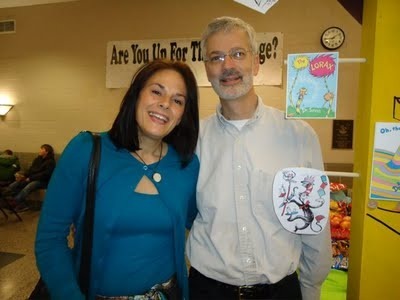 Anyone who knows Elizabeth Mosier knows at least these things:
Anyone who knows Elizabeth Mosier knows at least these things: She has a fine, discerning mind, an almost unearthly ability to read into a book just precisely what the author meant to place there, even if there's still fuzz around the work's edges.
She is an extraordinary teacher, beloved by her students, who remain her friends for years and years.
She is a very fine mother of two exquisite young ladies, and a thrower of parties that are forever fondly remembered.
She is there for you. She is there for us. She makes room in her life for others.
That is why those of us who are lucky to be Elizabeth's friends are so very excited for her that The Playgroup, a novella, is just now being released by the Gemma Open Door Foundation which, in the words of the North American Series Editor Brian Bouldry, "provides fresh stories, new ideas, and essential resources for young people and adults as they embrace the power of reading and the written word."
I had the great privilege of reading The Playgroup early on in its making. Its language sings and sizzles as it traces the thoughts and fears of a new mother now facing a troubled second pregnancy. Elizabeth knows how women think and what they actually say; she knows the commerce of young motherhood and the landscape of Arizona. I can't wait to read the book now in its final form, and I encourage all of you to seek it out.
Brava, Libby.




Published on August 25, 2011 07:01
August 24, 2011
A You Are My Only excerpt
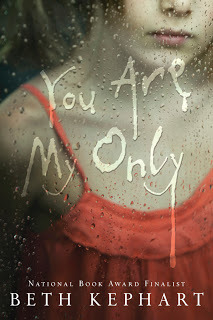 "You okay up there?" Arlen calls to me.
"You okay up there?" Arlen calls to me."Just fine," I call back. The sun has come up like a squint on the horizon. Most everything we travel by is pink. The glass in the shops. The windshields on cars. The glint flecks in the sidewalks and on the streets. I haven't seen a cop drive by. I've seen no posters on the trees. No one and nothing but me and Arlen searching for Baby. We take a ninety-degree angle hard and wobble our way back to a glide. My elbows hurt more than my fingers.
"How about you? You okay?" I call over my shoulder.
"Time is of the essence," Arlen says.
— You Are My Only (Laura Geringer Books/Egmont USA), forthcoming October 25, 2011




Published on August 24, 2011 08:31
August 22, 2011
Small Damages: The first words from Rita Williams-Garcia and Kathryn Erskine
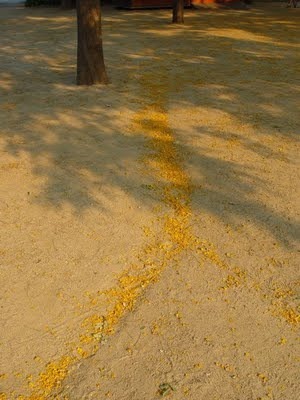 Those of you who have followed this blog know how graced I have been to enter the Philomel fold and to look forward, with editor Tamra Tuller and Philomel, to the publication of Small Damages next summer. More about this Seville-inspired book can be found here. But for the moment, I would like simply to thank the extraordinarily talented and generous authors Rita Williams-Garcia and Kathryn Erskine, who are the first to read this book in its final (gorgeously designed) galley form, beyond the good people at Philomel. I will always be indebted to them for their words.
Those of you who have followed this blog know how graced I have been to enter the Philomel fold and to look forward, with editor Tamra Tuller and Philomel, to the publication of Small Damages next summer. More about this Seville-inspired book can be found here. But for the moment, I would like simply to thank the extraordinarily talented and generous authors Rita Williams-Garcia and Kathryn Erskine, who are the first to read this book in its final (gorgeously designed) galley form, beyond the good people at Philomel. I will always be indebted to them for their words. "Small Damages is a wrenching celebration of choice. To read Kephart is to splendidly dream with both eyes open."
— Rita Williams-Garcia, One Crazy Summer, 2011 Newbery Honor Book and 2011 Coretta Scott King Award Winner
"As this delicate and luscious novel unfolds, the lines are blurred between love and loss, past and present, real and magical, and even life and death."
— Kathryn Erskine, Mockingbird, 2010 National Book Award winner, and The Absolute Value of Mike




Published on August 22, 2011 06:52
August 21, 2011
Yours truly (and YOU ARE MY ONLY) join the NetGalley community
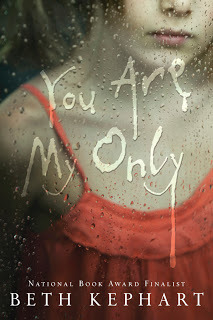 Bloggers and reviewers interested in an early read of You Are My Only can now click here for a NetGalley copy.
Bloggers and reviewers interested in an early read of You Are My Only can now click here for a NetGalley copy.On another NetGalley note: Today I officially joined this digital review community by downloading The Forgotten Waltz by Anne Enright. Look for my review of this W.W. Norton book and my interview with Miss Enright in the early days of October.




Published on August 21, 2011 15:12
A BBAW Long-List Nomination, a Return to Teaching, and WriteOnCon
 Today I drove through what might have been the hardest sustained rainfall I've ever seen. It had lessened somewhat by the time I got home and (drenched through) took this photograph. But even as I write this post, the weather remains wild, tumultous, otherworldy.
Today I drove through what might have been the hardest sustained rainfall I've ever seen. It had lessened somewhat by the time I got home and (drenched through) took this photograph. But even as I write this post, the weather remains wild, tumultous, otherworldy.Also otherworldly is the news today that this very blog, Beth Kephart Books, has been nominated for the long list in the Best Published Author Blog category for the 2011 BBAW Awards. The complete long lists will be published next week and short lists and winners announced thereafter. Truly, I am honored.
The BBAW news arrived with the news that I will be teaching Creative Nonfiction 135 once again at the University of Pennsylvania during the 2012 spring semester. Anyone who reads this blog knows just how much I love the teaching privilege. I hope to finish work on three books in progress (one of which is about the teaching of memoir) before the semester begins.
Finally, I wanted to share with my blog readers this treasure trove of YA stuff that I discovered only today. If I am late to the WriteOnCon scene, I am sincere in my appreciation for this wealth of insight and experience sharing from such YA writers, agents, and editors as Sara Zarr, Jay Asher, Josh Berk, Steve Malk, and the one and only Book Babe. I encourage you to take a look.




Published on August 21, 2011 12:45
The 2011 PAYA Festival: Meet some of the area's fine YA writers in West Chester, PA, on August 27
 For the second year running, West Chester, PA, will play host to the Bring YA to PA festival—an event that unites young adult authors, bloggers, librarians, and readers on behalf of the young adult library collections and services in Pennsylvania libraries. Writers like Josh Berk, Keri Mikulski, Ellen Jenson Abbott, and Sarah Darer Littman will be offering a writer's workshop starting at 10 A.M. Authors like A.S. King, April Linder, and Chelsea Swiggett will be attending. And because I'm lucky (and just slipped in under the wire) I will be there, too, joining in the fun and celebration.
For the second year running, West Chester, PA, will play host to the Bring YA to PA festival—an event that unites young adult authors, bloggers, librarians, and readers on behalf of the young adult library collections and services in Pennsylvania libraries. Writers like Josh Berk, Keri Mikulski, Ellen Jenson Abbott, and Sarah Darer Littman will be offering a writer's workshop starting at 10 A.M. Authors like A.S. King, April Linder, and Chelsea Swiggett will be attending. And because I'm lucky (and just slipped in under the wire) I will be there, too, joining in the fun and celebration.The 2011 PAYA Festival will be held on Saturday, August 27, at 1585 Paoli Pike, West Chester, PA, with the workshop running from ten to noon, and clustered author signings getting underway shortly thereafter (thanks to Children's Book World). I know that I'm looking forward to it. It would be fun to meet you there.




Published on August 21, 2011 05:25
August 20, 2011
Writing toward teen boys—the conversation continues
 A week or so ago, I posted a video by a bright young reader who was contemplating the How do we get teen boys to read more? question. This weekend, the New York Times is pondering that matter as well, with this video conversation between Rick Riordan, James Patterson, and Pamela Paul, as well as this Robert Lipsyte essay.
A week or so ago, I posted a video by a bright young reader who was contemplating the How do we get teen boys to read more? question. This weekend, the New York Times is pondering that matter as well, with this video conversation between Rick Riordan, James Patterson, and Pamela Paul, as well as this Robert Lipsyte essay. Good teachers and interested parents understand that the best cure for reluctant readers lies in identifying the right book for the right readers—easily said, but not always easily done. I had a hard time myself finding just the right books for my own son (a concern I explored in my memoir Seeing Past Z: Nurturing the Imagination in a Fast-Forward World), and even today, given a choice, this hardworking, curious, academically motivated, generous-hearted kid of mine leans away from books toward other media—except when writing his own stories. It's then that he professes himself most eager to see what others do, and he's especially eager to read the work of his contemporaries—his classmates, published young authors—finding most relevance and meaning in the stories they tell.
I spend a lot of time thinking about the relevance of my own work. I don't write toward trends, don't capitalize on them, and I'm rather ill-suited for a world like the one that Lipsyte describes in his essay, in which one Harper executive noted (in 2007) that "at least three-quarters of her target audience were girls, and they wanted to read about mean girls, gossip girls, fenemies and vampires." I have none of that in me. I would not know where to begin. And I am interested, frankly, in other things.
But I can write more inclusively, and I am working on that now, paying closer attention to the male characters in my stories, listening and leaning toward them. Now at work, as many of you know, on a book peopled by teen boys in late 19th century Philadelphia—a murdered, good-hearted thief, his animal-rescuing brother, and a rising careerist with journalism in his future—I find myself exhilarated by the self-generated task of writing a book of redemption and adventure that has at its center conflicted, complex young men. Dr. Radway's Sarsaparilla Resolvent, which will be illustrated with original, edgy art, is a prequel to Dangerous Neighbors (Egmont USA), my Centennial Philadelphia story about twin sisters. It is an outside-the-trends risk, as all my work tends to be. But it is also, I think, a risk worth taking, a readership that deserves our attention.
The book's first page can be found here.




Published on August 20, 2011 07:40



